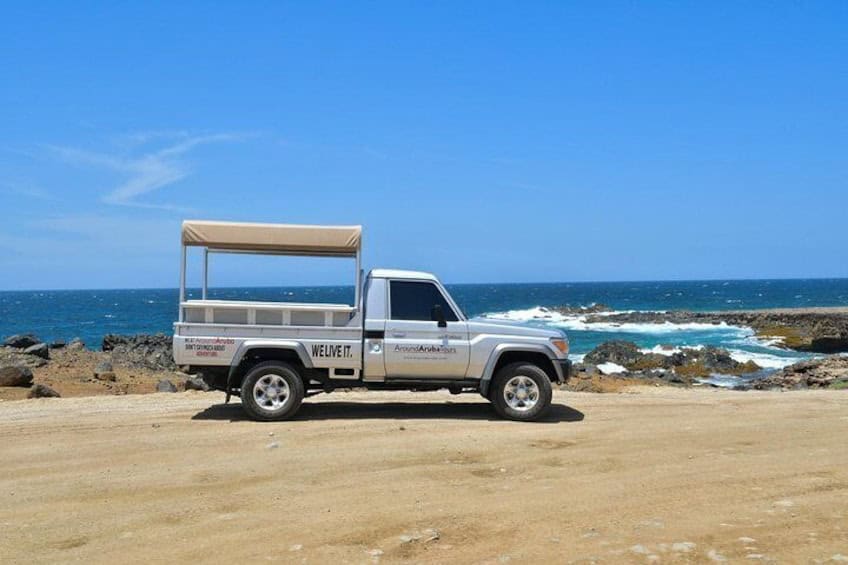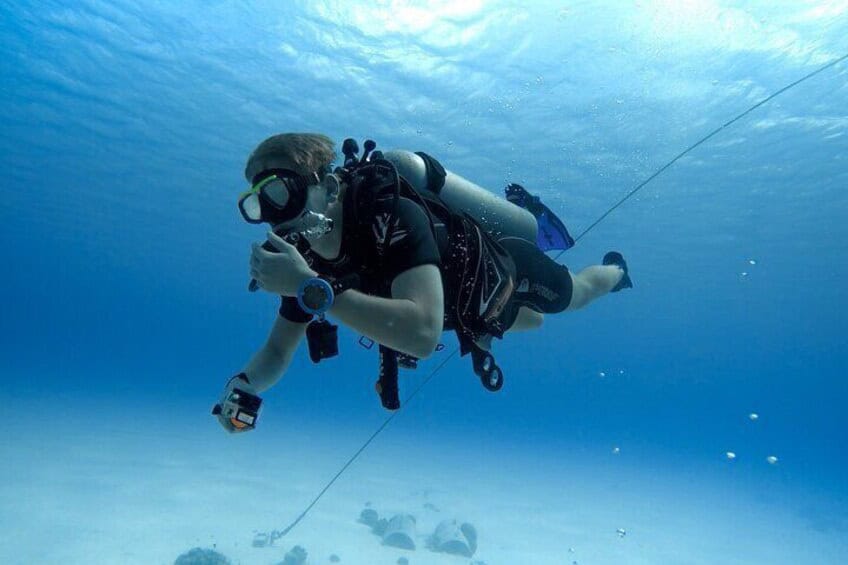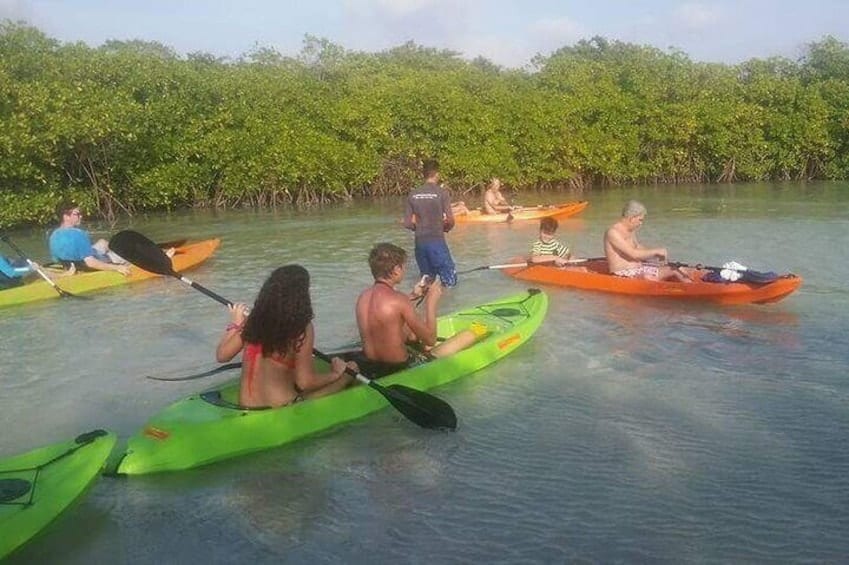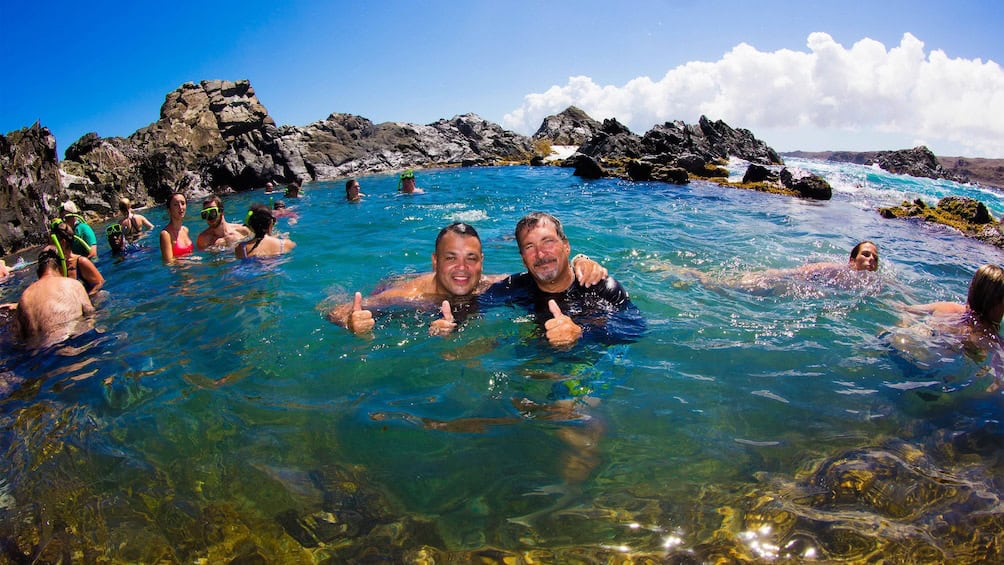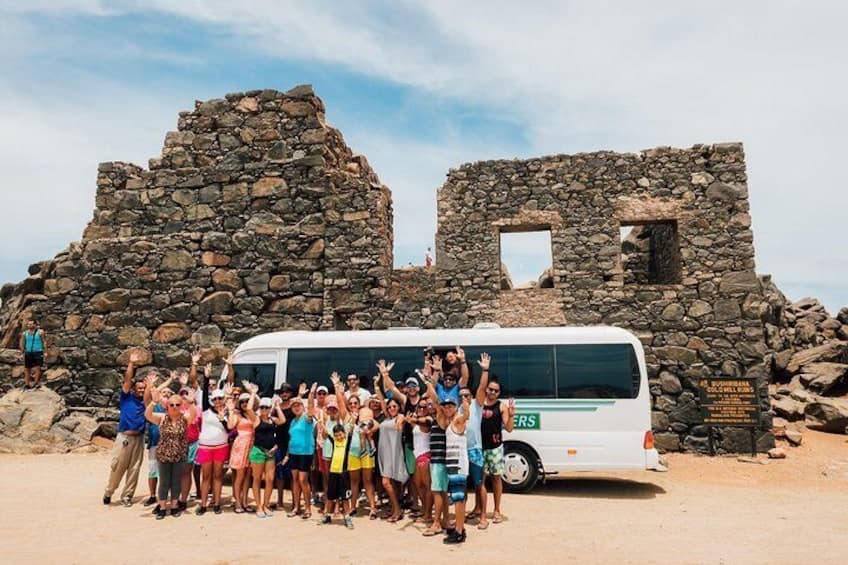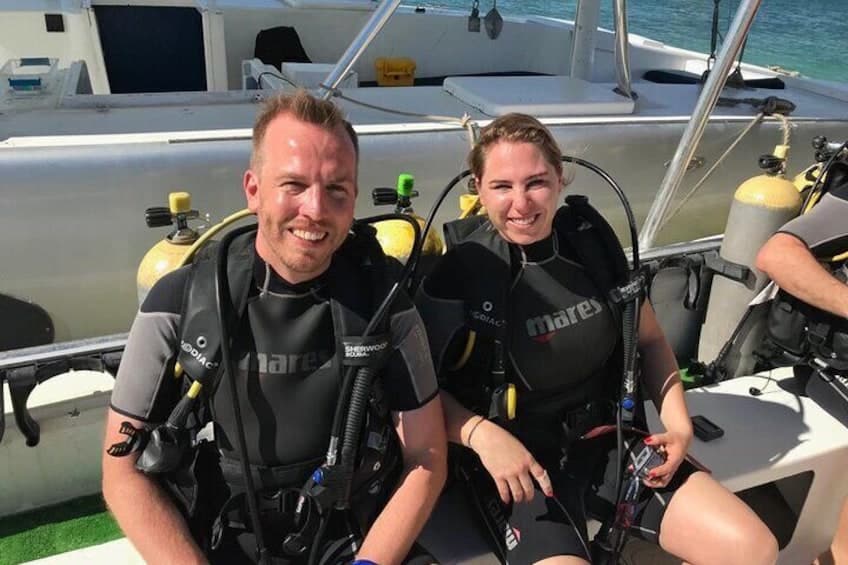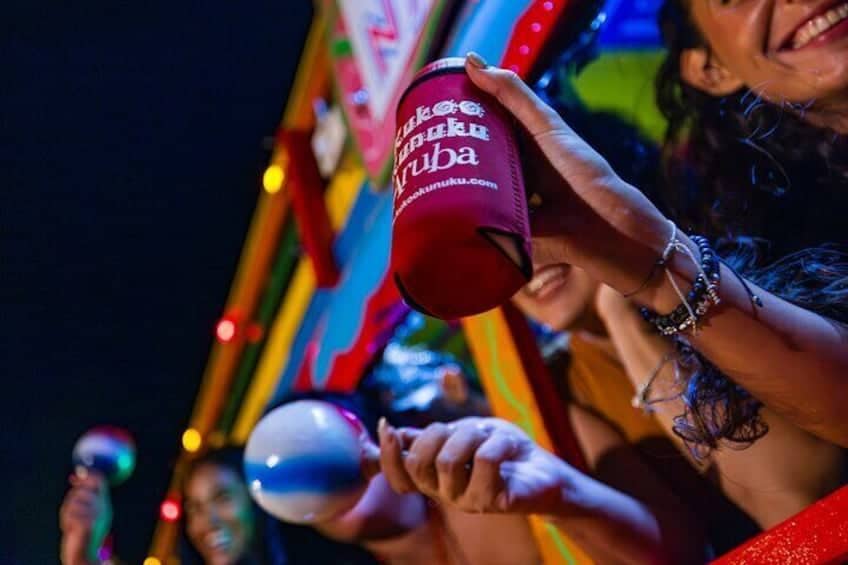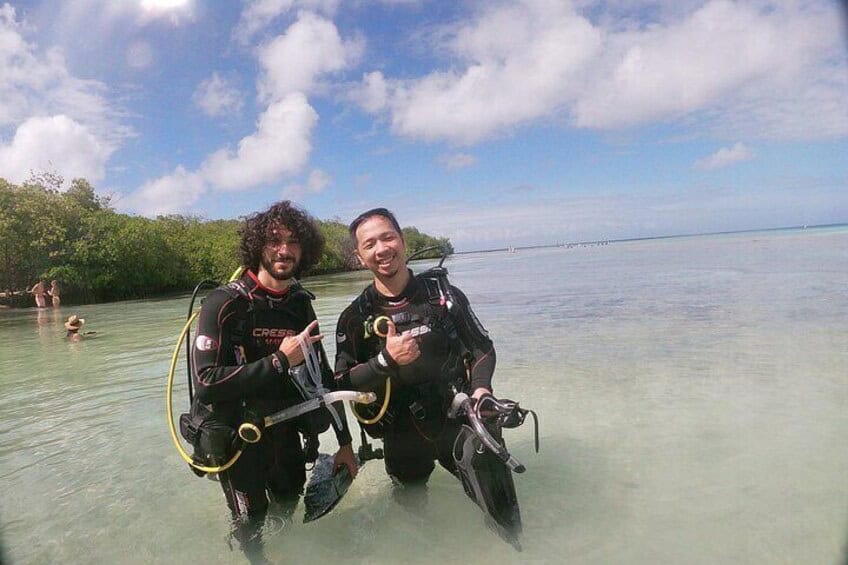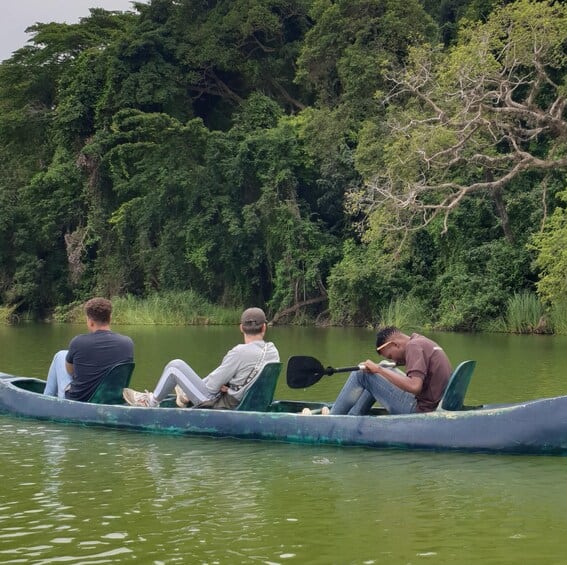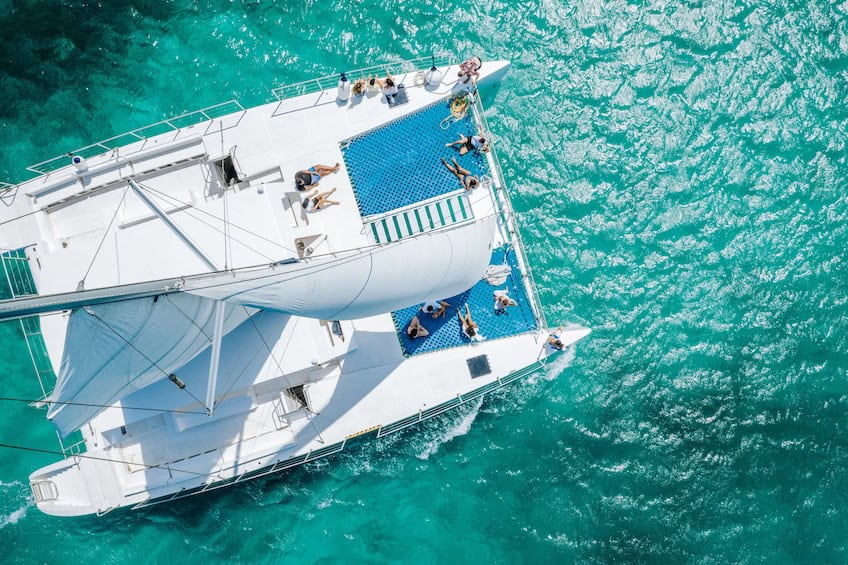Aruba
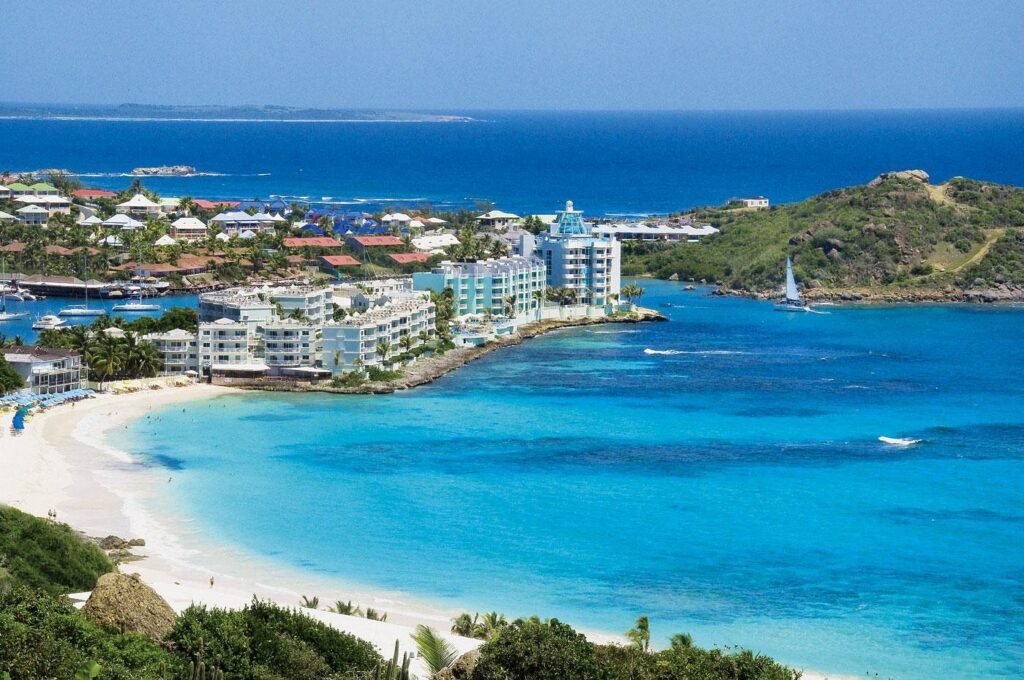
Welcome to Aruba - sunny, charming and royal
Dream away on pearly white beaches, warm trade winds and a laid-back island vibe. Aruba offers you the perfect blend of relaxation, culture and adventure.
On this page you will find practical info, exciting excursions, frequently asked questions and a direct way to contact us. From crystal clear waters and golden beaches to cultural discoveries and relaxation, Aruba has everything for your perfect vacation. Ready to hit the road? Contact us and plan your dream trip to this Caribbean paradise.
Discover activities in Aruba
Information about Aruba
About Aruba
Discover the unique Aruba
Welcome to Aruba, one of the three beautiful ABC islands in the southern Caribbean. This compact paradise is home to approximately 119,000 friendly residents in just 180 square kilometers.
Another side of the Caribbean
Unlike many other Caribbean destinations, Aruba has a unique landscape. The island is characterized by its dry climate and desert-like beauty, providing a refreshing contrast to the dense rainforests found elsewhere in the region. This special environment provides consistently sunny days – perfect for your vacation.
Languages you hear on the island
During your visit you will hear several languages. Dutch and Papiamentu are the official languages of Aruba. Papiamentu is a fascinating blend of cultures – a Creole language rooted in Portuguese, but enriched with words from Spanish, English, Dutch and various African languages. Interesting detail: Aruba uses its own unique spelling of Papiamentu, which differs from the nearby islands of Curaçao and Bonaire.
What you need to know when going to Aruba
Security and crime
As in other popular vacation destinations, petty crime occurs in Aruba. As a tourist, you can make your trip worry-free by taking a few simple precautions.
Stay alert during your stay and avoid becoming an easy target for thieves. Never leave valuable items such as jewelry, electronic devices or large sums of money visible in your hotel room or rental car.
Always keep a close eye on your money and personal belongings, especially in crowded places. Preferably carry cash, credit cards and important documents hidden on your body in a special travel wallet or waist bag under your clothes.
Be extra careful when visiting tourist attractions where many people congregate. Keep your passport, airline tickets and spare cash in a safe location in your accommodation. Always take a copy of your passport with you when you go out the door.
Should you become a victim of theft or robbery, report it to the local police immediately.
Travel documents for your Aruba trip
For your trip to Aruba, you need a valid Dutch passport. This passport must remain valid during your entire stay on the island. A Dutch identity card is not sufficient to travel to Aruba.
Electronic registration
Prior to your departure to Aruba, you must complete an electronic entry and exit card (ED card) online through the Aruban government’s official website.
Traveling with children
Children of all ages need their own valid passport for travel to Aruba. A separate ED card must also be completed for each child.
Are you traveling alone with minor children? Then make sure you have all the necessary permission documents with you to avoid delays at border control.
Paying in Aruba
The official currency in Aruba is the Aruban florin. American dollars are also accepted in many stores, restaurants and hotels. Euros can usually not be used directly, but can be exchanged at local banks.
The island has plenty of ATMs where you can withdraw money with your Dutch bank card. Check in advance with your bank whether your card is activated for use outside Europe.
Bring enough financial reserves for unexpected expenses such as extra nights in case of delays or higher costs than planned.
Mobile internet and calling
Check with your Dutch provider about the cost of calling and Internet use in Aruba. Taking out a special foreign package can save you a lot of money during your stay.
Emergency assistance
Aruba falls under the Caribbean part of the Kingdom of the Netherlands, so there is no Dutch embassy on the island. In emergency situations, contact local emergency services via the general emergency number 911.
Climate and seasons
Aruba’s perfect weather
As a tourist, you can enjoy Aruba’s wonderful tropical climate year-round. The island welcomes visitors with consistently sunny days and minimal rainfall. The temperature fluctuates around 30°C all year round, with the difference between the seasons being only about 2 degrees. It also hardly cools down at night – there is about 4 degrees difference between day and night. The crystal clear sea water has a pleasant temperature averaging 27°C, ideal for swimming and water sports.
Rainfall and best travel time
Aruba receives between 50 and 75 inches of precipitation annually, which is relatively little. The rain usually falls in short, intense showers during the morning hours that move quickly across the island. October, November and December are the wettest months, while August, September and October are the warmest. For the most pleasant temperatures, it is best to plan your visit in January or February.
Dealing smartly with the tropical sun
The afternoon between noon and 3 p.m. brings the brightest sunlight of the day. Many local stores and restaurants then operate a lunch break. As a visitor, you would be wise to seek shelter during these hours. The tropical sun is considerably more powerful than in temperate climates, causing you to burn more quickly than usual. Therefore, it is essential to regularly apply sunscreen with a high protection factor.
Environmentally friendly sun protection
Regular sunscreen poses a threat to Aruba’s beautiful coral reefs – just one drop can damage an area the size of a soccer field. Fortunately, local dive centers and gyms sell special reef-safe sunscreen that won’t harm the underwater world. This investment protects both your skin and the unique marine ecosystem.
Hurricane season and safety
During the Atlantic hurricane season from June 1 to November 30, there is an increased chance of tropical storms in the Caribbean. Fortunately, the Netherlands Antilles, including Aruba, lies outside the usual hurricane route. Severe storms are extremely rare here, allowing you to travel virtually worry-free all year.
(Public) transportation
Transportation by bus
Discover Aruba easily and affordably with the excellent public transportation system. Bus connections between Oranjestad and the various hotel zones are very reliable and budget-friendly for visitors.
The Arubus provides daily transportation along the popular hotel strip. A bus runs every 15 minutes from 5:45 a.m. to 6 p.m., after which the frequency is changed to every 40 minutes until 11:30 p.m. The main bus station is located in the heart of Oranjestad, within walking distance of both the cruise terminal and the famous Royal Plaza shopping center.
Driving in Aruba
Tourists with a Dutch driver’s license can rent a car and drive in Aruba without any problems. Your European Dutch driver’s license is officially recognized on the island.
Cycling through paradise
Explore Aruba on two wheels for a unique island experience. The island has several bicycle routes and the local government is actively investing in the expansion of the bike path network for an even better cycling experience.
For convenient bike rentals, you can use Green Bike since 2017. This innovative system has eight strategically placed rental stations with a total of 100 modern bikes. The user-friendly vending machines allow you to rent a bike 24/7, perfect for spontaneous exploration.
The airport
Your gateway to paradise
Queen Beatrix International Airport welcomes you to the beautiful island of Aruba. Strategically located near the capital city of Oranjestad, this modern airport is the perfect start to your tropical vacation.
Excellent international connections
As a visitor, you can enjoy direct flights from numerous destinations. The airport maintains regular connections to the Netherlands and other European cities, making it easy for Dutch tourists to travel to this Caribbean gem. Frequent flights are also available from North America, South America and other Caribbean islands.
Tribute to Dutch history
The airport bears the name of former Queen Beatrix, symbolizing the special bond between Aruba and the Netherlands. This naming reflects the rich history and cultural connection that characterizes the island.
The heart of Aruba’s tourism
For vacationers, the airport serves as the main gateway to Aruba’s white beaches, crystal clear waters and welcoming culture. Its strategic location makes it easy to quickly travel to your hotel or resort and begin your island adventure.
Events
As a tourist in Aruba, you can enjoy spectacular events throughout the year that perfectly reflect the island’s vibrant culture. From lavish carnival celebrations to intimate cultural experiences, here are the highlights that deserve your calendar.
Carnival season – an explosion of color and joy
From January to March, Aruba transforms into a festive paradise during the carnival season. The streets fill with dancers in beautiful costumes, riveting music and an infectious party atmosphere. This month-long celebration reaches its peak in February and early March, when grand parades pass through the main streets and the entire island is immersed in revelry.
Boatsfest – where beach and music come together
Every year on Jan. 21, Aruba celebrates its unique beach and water culture during Boatsfest. This vibrant event takes place at the legendary Surfside Beach Bar and offers visitors a perfect blend of tropical music, exciting water activities and authentic island atmosphere. It is an ideal opportunity to experience local beach culture up close.
Bon Bini festival – authentic Aruban traditions
Every Tuesday night, visitors get the chance to immerse themselves in Aruba’s rich folklore. The Bon Bini festival offers an intimate introduction to traditional music, colorful folk dances and delicious local specialties. This weekly celebration gives you an authentic insight into the island’s culture and traditions.
International regatta – world-class sailing
In June, Aruba becomes the center of the sailing world during the International Regatta. This prestigious Event attracts renowned sailors from all over the region and offers spectators an exciting spectacle of sportsmanship and skill on the crystal clear waters surrounding the island.
Other special moments
Throughout the year, other festive occasions take place that can enrich your trip. Kings Day on April 27 brings a Dutch touch to the Caribbean setting, while the Aruba Art Fair spotlights local artists. Easter celebrations also have their own tropical character here, adding to the unique cultural identity of this beautiful island.
History
Discover the Rich History of Aruba
As you explore the beautiful beaches of Aruba, you are walking on an island with a fascinating past. The origin of the name “Aruba” still poses an intriguing mystery dating back to its original inhabitants.
From Mysterious Origins to Modern Nation
The story begins with the Arawak Indians, whose language has unfortunately completely disappeared from our world. Experts believe the name “Aruba” has its roots in this ancient language. Interestingly, the name first appears in written history in 1526 – a document that is now almost 500 years old! To this day, it remains a mystery whether the island took its name from the people who lived there, or if it was the other way around.
A Unique Political Journey
Aruba’s modern history took a decisive turn on New Year’s Day 1986. On that historic date, the island seceded from the Netherlands Antilles and was given a special status: an autonomous country within the Dutch Kingdom. This “separate status” meant that Aruba, along with the Netherlands itself, became an equal partner within the Kingdom.
The first democratic elections under this new status took place on Jan. 6, 1989. The MEP party won a convincing victory with 10 of the 21 seats available in parliament.
Choices that Shaped Modern Aruba
An important turning point came in June 1990, when Prime Minister Nelson Oduber and Dutch Minister Hirsch Ballin decided to continue Aruba’s special status. Originally planned to become fully independent in 1996, Aruba made a final decision not to take this step in 1994. The Netherlands respected this choice and stopped promoting full independence.
This decision gave Aruba the best of both worlds: autonomy in its own affairs, but with the security of the Dutch connection. Importantly, the island always retains the option to still choose full independence in the future.
Aruba Today
The year 2010 brought one last major change. On October 10 of that year, the Netherlands Antilles were abolished as a political entity. Curaçao and Saint Martin then received the same autonomous status that Aruba had already enjoyed since 1986.
Today, visitors can enjoy a unique island that charts its own course while being part of a larger whole. This rich political history has contributed to the stable, welcoming society that travelers experience today on this beautiful Caribbean island.
Traditional food and drink
Discover the Authentic Flavors of Aruba: A Culinary Journey for Travelers
Welcome to the culinary paradise of Aruba! As a tourist on this beautiful island, a true taste explosion of traditional dishes passed down for centuries from generation to generation awaits you. Be surprised by the unique cuisine that combines Caribbean flair with local ingredients.
Main courses that will make your mouth water
Pisca Hasa is the absolute crowning glory of Aruban cuisine. This deliciously spiced fish, crispy fried or fried, is traditionally served with fresh side dishes such as sweet plantain, the local pancake “pan bati” (prepared with sorghum flour), or the creamy corn porridge “funchi” reminiscent of Italian polenta. Also be sure to try the authentic criollo sauce – a delicate tomato sauce with onions and vinegar – or the spicy pica den vinager.
Stobá puts you in touch with the soul of Aruban cooking tradition. These rich stews range from the robust Kabritu Stobá (with tender goat meat) to the popular Galina Stobá (with succulent chicken). Vegetarians will be amazed by the surprising Papaya Stobá, in which sweet papaya adds a unique twist to this traditional dish.
Warming Soups for Every Flavor
The Sopi collection showcases Aruba’s creativity in soup preparation. Try the savory Sopi di Karni (beef), the exotic Sopi di Yuana with iguana meat, or the comfortable Sopi di Kabritu. For a special experience, try the Sopi di Kadushi, where the local cactus adds surprising texture and flavor.
Yambo (also known as Guiambo) is a must-try for adventurous foodies. This complex dish combines fresh okra with salted meat, fish, local cheese, shrimp and karko shellfish – a true symphony of sea and land.
Local Snacks Perfect for On the Go
During your island exploration, Pastechi are your ideal travel companion – crispy pies filled with fish, meat, cheese or ham. Palito (sausage in crispy dough) and Johnny Cake (a traditional flat pie) are perfect for a quick, authentic bite. Local croquettes offer an interesting variation on the Dutch version – more compact and full of flavor.
Sweet Temptations That Make Your Holiday Complete
Aruba’s dessert culture is rich and varied. Bolo (traditional cakes) come in countless varieties, while Tèrt – similar to flan but with coconut or plums – offers a local twist on familiar flavors.
Be sure to try the Repa di Pampuna (pumpkin pancake), Kokada (grated coconut delicacy), or Koi Lechi (sweet milk candy). For a real treat, discover Bolo Pretu, a dark fruit cake with fruits soaked in alcohol that represents months of flavor development.
Refreshing Beverages for the Tropical Climate
Cool down with authentic drinks such as Awa di Lamunchi (lemon drink), Awa di Tamarin (tamarind drink), or Awa di Sorsaka (soursack drink). For chocolate lovers, Chukulati di Pinda – chocolate milk made from peanuts – is a unique and surprising experience.
Meaning of the flag
Discover the colorful meaning behind Aruba’s iconic flag
As a visitor to this Caribbean paradise, you see the beautiful flag of Aruba flying everywhere – but did you know that each element tells a story about this special island?
The sky blue canvas That breathtaking light blue background? That’s no coincidence. This color reflects exactly what you will experience every day as a tourist: the crystal-clear Caribbean sea and endless blue skies that make Aruba such a sought-after vacation destination.
The mysterious red star The heart of the flag is formed by a striking four-pointed star in fiery red. This star symbolizes Aruba itself, but also something every traveler will appreciate: the four languages you hear all over the island. From melodious Papiamentu to Dutch, Spanish and English – communicating is never a problem here!
Golden stripes full of meaning Those two rays of sunshine in yellow? They tell the story of Aruba’s special position within the Kingdom of the Netherlands. For you as a visitor, they also symbolize the island’s two pillars: the thriving tourism industry that welcomes you, and the local economy that makes the island shine.
The white edge of the surf That subtle white edge around the star is more than decoration – it depicts the foam heads of the waves that lovingly lap the island. Exactly those waves you will soon be swimming in!
A Flag Born in 1976 This meaningful flag was officially hoisted on March 18, 1976, and has welcomed millions of visitors to this Caribbean gem ever since.
Your Aruba adventure awaits
Imagine azure waters, powder-soft beaches and those warm tradewinds that pamper you daily. Aruba effortlessly combines pure relaxation with fascinating culture and exciting adventures. Whether you come for the legendary beaches, the colorful local culture, or the exciting water sports – this island has something magical in store for every traveler.
Ready to write your own Aruba story? Get inspired by all that this Caribbean paradise has to offer and make your dream vacation a reality.
Your journey, just the way you want it
Whether you dream of a private snorkeling tour, a surprise trip for a special occasion or just want to be completely unburdened, we will arrange it! Together, we’ll put together a unique experience that perfectly suits your needs. Personalized, flexible and organized to perfection.
Our promise for your travel experience
More than travel: experience, develop and grow
Blue Bird is not just about vacationing, but about experiences that enrich you. Our trips give you the chance to really get to know other cultures and come back with a broader view of the world.
Access to unique experiences worldwide
From local meetings to exclusive tours, we select only the most special and authentic experiences. Think foreign weddings, milestone trips, study trips and business inspiration experiences.
Personal, engaged and culturally aware
We believe in travel with depth. That’s why we work with local partners, provide culturally respectful experiences and personally guide you every step of the way.

